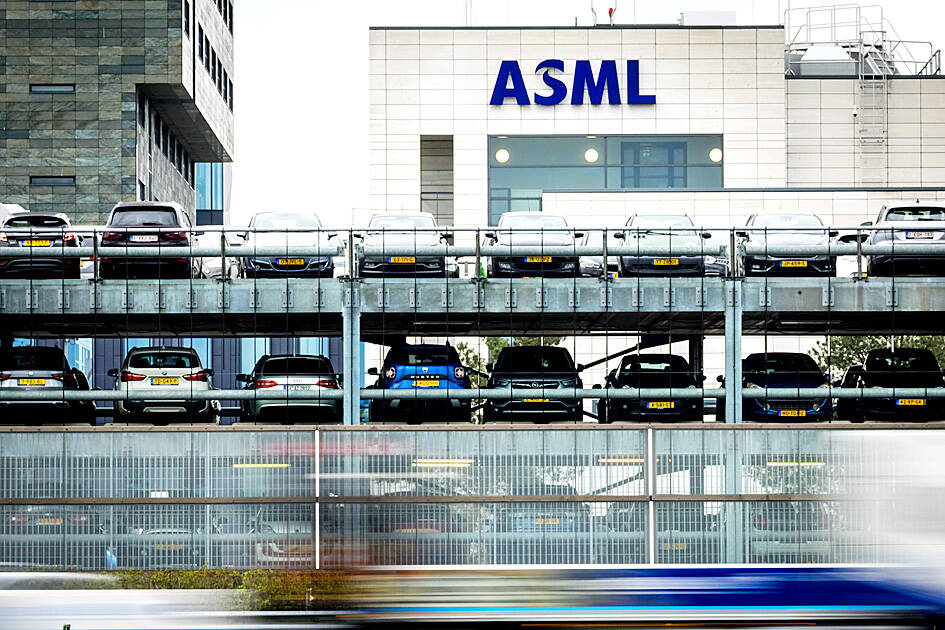China is “dissatisfied” with the Dutch government’s decision to expand export controls on ASML Holding NV chipmaking equipment, the Chinese Ministry of Commerce said in a statement yesterday.
The Dutch government on Friday said it would expand export licensing requirements for ASML’s 1970i and 1980i Deep Ultraviolet immersion lithography tools, aligning its rules with export restrictions the US unilaterally imposed on the machines last year.
Beijing has repeatedly criticized Washington’s strategy of pressuring allies, such as the Netherlands and Japan, to join export controls targeting Chinese access to cutting-edge chips and chipmaking equipment.

Photo: Rob Engelaar, EPA-EFE
“In recent years, in order to maintain its global hegemony, the US has continued to ... coerce certain countries to tighten export control measures for semiconductors and [related] equipment ... China is resolutely opposed to this,” the ministry said in response to the Dutch government’s announcement on Friday.
The Dutch should not abuse export controls, avoid measures that damage Sino-Dutch cooperation in semiconductors and safeguard the “common interests of Chinese and Dutch enterprises,” it added.
US lobbying has effectively stopped ASML, the world’s biggest vendor of chipmaking equipment, from exporting its most advanced lithography systems to China to slow Beijing’s technological and military advances.
The decision was made “for our safety,” Dutch Minister for Foreign Trade and Development Cooperation Reinette Klever said on Friday. “We see that due to technological developments, there are more safety risks in the export of these specific production machines.”
ASML said in a statement that it did not expect the change in oversight to impact earnings this year or in the future.
Under US pressure, the Dutch government has never allowed ASML to ship its very best EUV tools to Chinese customers.

On Tuesday, US President Donald Trump weighed in on a pressing national issue: The rebranding of a restaurant chain. Last week, Cracker Barrel, a Tennessee company whose nationwide locations lean heavily on a cozy, old-timey aesthetic — “rocking chairs on the porch, a warm fire in the hearth, peg games on the table” — announced it was updating its logo. Uncle Herschel, the man who once appeared next to the letters with a barrel, was gone. It sparked ire on the right, with Donald Trump Jr leading a charge against the rebranding: “WTF is wrong with Cracker Barrel?!” Later, Trump Sr weighed

Taiwan Semiconductor Manufacturing Co (TSMC, 台積電) secured a record 70.2 percent share of the global foundry business in the second quarter, up from 67.6 percent the previous quarter, and continued widening its lead over second-placed Samsung Electronics Co, TrendForce Corp (集邦科技) said on Monday. TSMC posted US$30.24 billion in sales in the April-to-June period, up 18.5 percent from the previous quarter, driven by major smartphone customers entering their ramp-up cycle and robust demand for artificial intelligence chips, laptops and PCs, which boosted wafer shipments and average selling prices, TrendForce said in a report. Samsung’s sales also grew in the second quarter, up

HEADWINDS: Upfront investment is unavoidable in the merger, but cost savings would materialize over time, TS Financial Holding Co president Welch Lin said TS Financial Holding Co (台新新光金控) said it would take about two years before the benefits of its merger with Shin Kong Financial Holding Co (新光金控) become evident, as the group prioritizes the consolidation of its major subsidiaries. “The group’s priority is to complete the consolidation of different subsidiaries,” Welch Lin (林維俊), president of the nation’s fourth-largest financial conglomerate by assets, told reporters during its first earnings briefing since the merger took effect on July 24. The asset management units are scheduled to merge in November, followed by life insurance in January next year and securities operations in April, Lin said. Banking integration,

LOOPHOLES: The move is to end a break that was aiding foreign producers without any similar benefit for US manufacturers, the US Department of Commerce said US President Donald Trump’s administration would make it harder for Samsung Electronics Co and SK Hynix Inc to ship critical equipment to their chipmaking operations in China, dealing a potential blow to the companies’ production in the world’s largest semiconductor market. The US Department of Commerce in a notice published on Friday said that it was revoking waivers for Samsung and SK Hynix to use US technologies in their Chinese operations. The companies had been operating in China under regulations that allow them to import chipmaking equipment without applying for a new license each time. The move would revise what is known